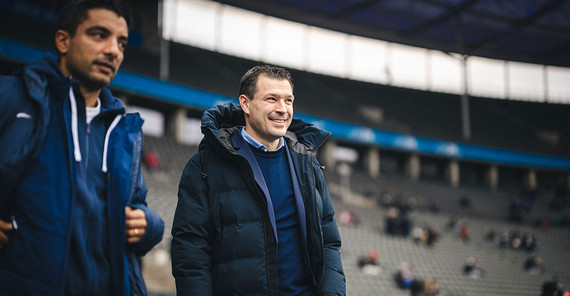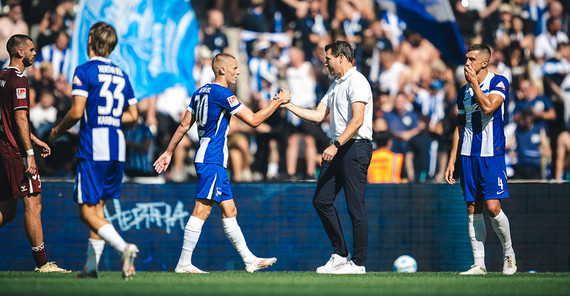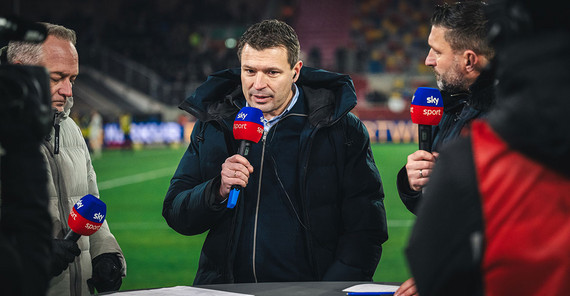What is important to him as sporting director? Weber doesn’t have to think twice: communication. “That may sound trivial, but in my view, it’s essential in a business where you have to deal with a lot of people – whether players, coaches, employees, or fans – which is very media-driven and where the tabloid press is very present, especially in Berlin.” It is easy to see that he cares about dialog. The man with the dark hair and open smile comes across as approachable and speaks at eye level. He answers questions to the point but also gives the other person space. After all, his job is not least a diplomatic one: club members, coaches, the team, and the media – Weber is in conversation with everyone, ultimately for the fans. “We are a club that has a very close relationship with the fan community. I try to approach the task in a down-to-earth and humble manner, knowing that I represent a club with over 60,000 members, in good and bad times.”
Between office and stadium
Weber has been sporting director since the beginning of 2023. His workplace is in the Olympic Park in Berlin-Charlottenburg. He spends half the day in the office, the other half outside, on the field or in the stadium. His days are long and full of discussions: with the coaching team, the management, the scouting department, the communications department, or those responsible for youth and women’s soccer. He tries to watch training sessions as often as possible. When there is a home match on the weekend, Weber is at the Olympic Stadium, while he travels with the team for away games all over Germany. “Then I’m involved in all the discussions about the match and answer questions from the press, radio, and television.”
Benjamin Weber knew quite early on what he wanted and where he wanted to go. And he persistently pursued his aims, even if he had to be patient many times. He decided to study sports during his high school years. Born in Berlin, he applied to Humboldt University, but because of a decimal place difference in the numerus clausus, he ended up at the University of Potsdam in 2000. “That was actually the best thing that could happen. I have never regretted studying in Potsdam.” In the sports science degree program with a focus on sports economics/sports management, he got to know all three campuses well: He attended business administration lectures in Griebnitzsee, sports science courses on the Am Neuen Palais campus, and trained in the gym in Golm – “one of the few new buildings on that campus at the time,” Weber says.
It is true that he had also fancied the profession of a sports journalist during his studies. An internship at a radio station offered him valuable insights, and Weber still likes to think back to his time in the economics and politics department in the main studio of Norddeutscher Rundfunk. However, he did not see himself as an investigative journalist. So he made his decision to work in sports management when he had just completed his intermediate diploma. “I was supposed to give a presentation about the sports buildings at the 2006 World Cup in Germany, and it became clear to me then that I wanted to work in soccer.” And that is what happened, even if it was not exactly for the World Championships.
A feeling for the fans’ wishes and dreams
It has been more than 20 years since Benjamin Weber’s career at Hertha BSC began – with an unsolicited application to the assistant of the then managing director Dieter Hoeneß. Weber was 23 at the time. After an invitation to an interview, nothing happened for two months until the call finally came. “It was on a Saturday and I was supposed to start on Monday, I remember exactly,” he says and laughs. From 2003 on, as a student trainee in the sports department, he took care of the organization of friendly matches, training camps, and training allowances. “At some point, Hoeneß asked me when I would finish my studies. And I said: a year from now.” He still had to obtain several credit points, however, and write a diploma thesis. But he succeeded, and he completed his diploma “on time” under the supervision of Christoph Rasche, who is still Professor of Management, Professional Services and Sport Economics in Potsdam, with a thesis on club structures and corporate entities.
“Now I can start working full-time at Hertha,” the sports economist thought. But due to financial problems, there were no new hires at that time, so he first worked in an advertising agency until, after the “summer fairy tale”, he got a foot in the door of the club again in the field of sponsoring and marketing. From 2014, he then headed the “Academy”, the club’s youth section, for eight years. “That was a stroke of luck for me. It is certainly also a deep longing of the Hertha fans to see their junior team on the field as professionals at some point.”
More than 200 children and adolescents train here in addition to school, and almost all of them come from Berlin and Brandenburg. “As a rule, only a handful of players of one age group make it into professional soccer per year.” That’s why the club wants the players to continue school for as long as possible. “When the boys train their minds, they also develop athletically. That’s our experience. Sometimes we wanted them to graduate from high school more than they did,” says Weber with a smile. In 2017/18, Hertha BSC became German champions for the first time with the A-Youth. “Probably six or seven players from that year have become professionals but have also graduated from high school,” Weber says proudly. As director of the Academy, he always enjoyed accompanying the athletes’ careers, for example those of Pascal Klemens, Linus Gechter, and Ibrahim Maza, who are now part of the professional squad, or Maximilian Mittelstädt, who has been playing for the national team since 2024.
Club with a social mission
He had been nominated for the post of sporting director by the then president Kay Bernstein, who wanted to strengthen the link between youth and professional soccer. For Weber, his job is still more than professional soccer to this day. After all, he sees the club’s social mission – in youth work, in women’s soccer, or in popular sport. Since 2023, Hertha BSC has had its own girls’ and women’s department – also thanks to the commitment of the club members. “We get very wide support for it.” As in the men’s or junior sections, Weber wants to put a clear focus on the development of young players. With initiatives such as “Professional Clubs Go to Schools” and “Professional Clubs Go to Daycare Centers”, the “Old Lady” is also committed to combating the lack of exercise among children and adolescents. Other major sports clubs such as the ice-hockey club Eisbären, the handball club Füchse and the soccer club 1. FC Union are also cooperation partners in the project of the Berlin Senate Administration.
Did his studies prepare him well for his position as sporting director? “Studying can give you some kind of direction and help you define your own path, also because you have to organize yourself.” However, his professional experience was more decisive for the requirements of his current job. It takes negotiating skills with coaches, players, and members. You need a feel for the fans' wishes and dreams. But something else is essential in professional sport: You have to put on a thick skin. Where else is there so much judgment, so much searching for mistakes and those responsible? Where else do cheers and whistles alternate from match to match, from week to week? The tabloid press and social media do the rest. “Media are quite a force. And with such a large fan base, you have to be able to deal with criticism,” he says. But for Weber, that’s part of it all. And he is enough of a communications professional not to look at every post on the social platforms. The most important thing for him is to be able to look in the mirror every morning. Something else comforts him. “Even if you can’t kick the ball into the goal yourself, of course, you have the chance to make a difference every weekend. That’s the good thing.”
This text was published in the university magazine Portal - One 2025 “Children”.



